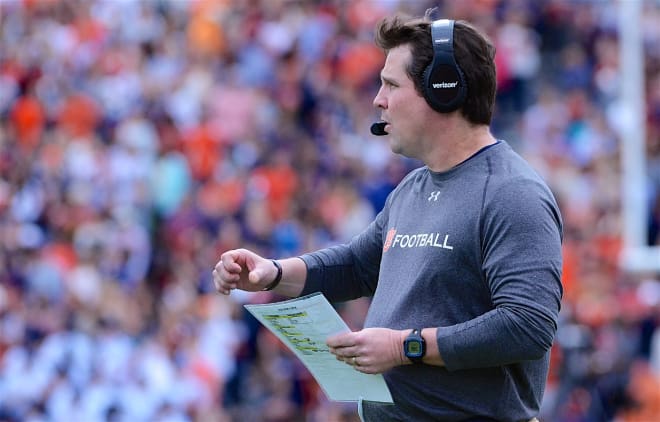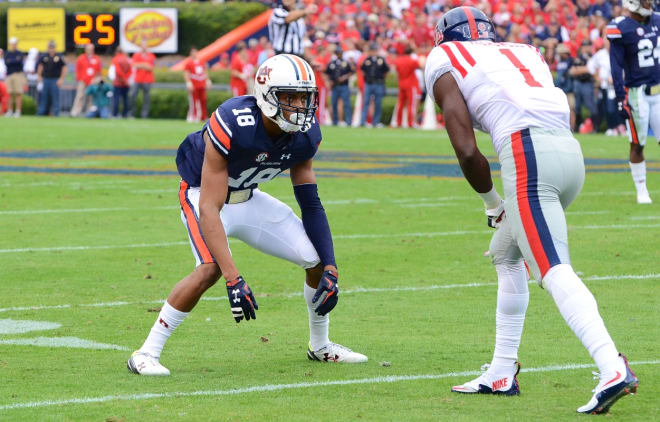Will Muschamp: A Review
His third tour on the Plains didn't yield great numbers, but Muschamp nonetheless moved Auburn a step closer to contention.

AUBURN | Will Muschamp is gone now, his introductory press conference at South Carolina ended a few hours ago, and there are reasons for Auburn supporters to be upset.
He signed a three-year deal with Auburn last winter and told everyone who would listen that he'd be here for the duration. I knew that probably wasn't true. You figured it probably wasn't true. The players he signed? Some believed it and some didn't.
Thirty years ago, players trusted coaches to stick around a while. Now college football has become a loose affiliation of millionaires and the money, in many cases, fundamentally has changed how coaches view their careers. Consider that Tommy Tuberville scraped by during the 1999 season on just $750,000 while Muschamp made more than double that figure as Auburn's defensive coordinator last year.
This is how it works now. Nobody stays put. Guys like Frank Beamer, the Virginia Tech coach who spent 29 seasons as the Hokies' leader, don't exist any longer. Georgia coach Mark Richt was called on the carpet a few weeks back after finishing 9-3 with wins over rivals Auburn and Georgia Tech. This is how it works now. Coaches must find the money, earn the money, gain security and hope for the best.
That's exactly what Muschamp did. He found the money: $3 million per year at South Carolina. Good for him. He's a good person who did good things for the players he coached at Auburn.
And that's where I'll begin with this assessment.
CULTURE
Muschamp was surprised by the defensive mode of operation he observed upon arrival last winter. He saw very little toughness. It's reasonable to blame Ellis Johnson, Muschamp's predecessor, for that loss of toughness. Most people do. I've always been skeptical there because Gus Malzahn intentionally throttled back the physicality of practices in an effort to avoid injuries during the 2014 season.
Every coach will tell you that you play the way you practice. Even Ellis Johnson will tell you that. He was behind the 8-ball during his final season because of Malzahn's edict and, well, that muddles things when it comes to placing blame.
Muschamp was briefed on that edict before he was hired at Auburn, however, and Malzahn allowed an ample number of contact drills this season. He held to his word and Muschamp was satisfied with how practices were scripted and managed this fall.
Changing the culture requires more than some Oklahoma drills, however. It requires unwavering attention placed upon how you're devising next season's roster. Johnson and his staff emphasized aptitude and statistical markers on the field. They sought statistical legitimacy. Muschamp instead focused almost solely on two indices: Willingness to hit and competitive fervor. He can deal with a lack of size, a lack of speed, short arms, maybe even a little extra weight. He cannot deal with players who will not engage when it's time to engage. He feels like that cannot be taught.
Muschamp was cut-throat with his evaluations. If he liked a player and later decided that he didn't engage, the player's scholarship offer was cut. He did this a few times on the spot, simply cutting all ties with a prospect based solely on footage from a spring scrimmage or practice. He trusts his eyes. He wants disruptors. He wants hell-raisers.
He was determined to find them and sign them. Muschamp, with help chiefly from Travaris Robinson and Lance Thompson, was able to find a few of those disruptive hell-raisers. Carlton Davis' freshman season was a runaway success. Tim Irvin did some nice things. Jeremiah Dinson was coming along until a freak injury at Texas A&M. Dontavius Russell benefited greatly from Muschamp's presence along with Tre Williams, Devaroe Lawrence and Rudy Ford.
Changing the culture and re-populating the roster with the right kinds of players was going to take a few years. Muschamp was on schedule.
PERFORMANCE
Auburn's defense was below average (again) this season from a statistical perspective. Points allowed per game and yards allowed per game were higher in 2015 than they were in 2014 while takeaways dropped from 27 to 18. By nearly any objective measure, the Tigers didn't improve under Muschamp.
Yet there was a critical difference on the field. Auburn's defense went after people and made an effort to impose their will on the opponent. Pads always were popping. Crowds ooh'd and aah'd as the Tigers lined up graphic hits in space. Teams that played Auburn, by and large, needed a day off after playing Muschamp's defense. Does that have value? A mathematician would say no; a football coach could argue a better approach is worth more than statistics.
Muschamp also dealt with some unexpected setbacks. Defensive end Carl Lawson, the team's best defender and perhaps best overall player, missed seven weeks because of a hip injury. The Tigers were thin along the defensive line even before Lawson went down against Louisville. The next two months required Muschamp and his staff to deviate from their plans in an effort to create some pass rush. It didn't work in a general sense, though Cassanova McKinzy really warmed to his re-imagined role as a part-time "buck."
The defense also was affected by Auburn's protracted troubles at quarterback, which led to fewer points, shortened drives and a serious disadvantage in time of possession. In short, the offense relied far too often on the defense and offered too little in return. The relationship was far from symbiotic.

RAMIFICATIONS
Muschamp hoped he was coming to Auburn at just the right time. Remember that one year ago, this looked like a program headed for another nationally relevant crescendo, complete with a star quarterback (Jeremy Johnson) and a host of top-tier players on both sides of the ball.
Lawson went down, Johnson crumbled, the offense lost its way and the rest is history. Muschamp's third period of employment on the Plains ended with a 6-6 regular season record and an invitation to the Birmingham Bowl. His return was a failure on the field, at least in most respects, though Muschamp's personal goal was achieved officially Monday during a press conference in Columbia.
He landed the head coach job he'd sought since being fired at Florida.
Mission accomplished.
Auburn benefited as well. It's objectively better off for having Muschamp inside its walls for nearly one full year. He was able to sign several high-caliber players the Tigers wouldn't have been able to sign without him. He also created an environment where toughness isn't a goal; it's a requisite behavior expected to be shown during every drill and every snap. The work ethic is better. Accountability means more. There is more self-motivation.
Malzahn isn't a defensive guy and doesn't seriously scrutinize what happens on that side of the ball, but he learned things from Muschamp.
He admired the way Muschamp trusted his gut with player evaluations. He admired the way Muschamp made the most of his autonomy without inappropriately challenging the head coach in any way. Muschamp was intense within his sphere of influence and deferred to others outside of it.
Muschamp knew how to be a good lieutenant. And that's exactly what he was.
The two coaches never had any significant interpersonal issues, regardless of what you may have heard. Sure, Muschamp probably thought Malzahn was a little laissez-faire in some managerial situations, but Muschamp also understands that he's unnecessarily abrupt and cavalier at times. He has his own demons and he mentioned them during his press conference today -- specifically his "sideline demeanor" and how he needs to tone it down a bit.
That's probably a good thing.
The next coordinator's job won't be easy. Lawson and tackle Montravius Adams may leave early for the NFL. Three of the team's top four linebackers are seniors as well as the top cornerback (Jay Jones) and top utility defensive back (Blake Countess).
The good news? Everyone who suits up for spring practice will have a far better understanding of how to practice the right way, how to create and maintain personal intensity. Sounds like a given, right?
Muschamp thought it was a given, too. It wasn't. Simply creating those expectations and enforcing those expectations may have been worth the $1.6 million alone, come to think of it.
Talk about this piece in The Bunker, our potentially award-winning message board.
